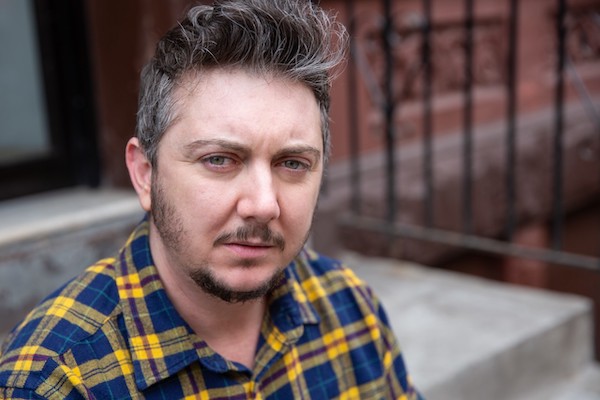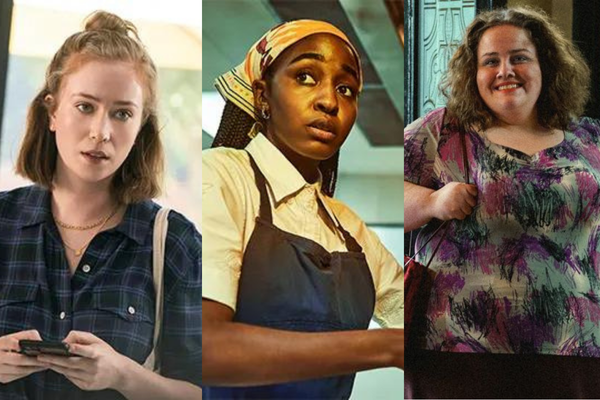
A Lesbian Ode to Kate McKinnon
May 25, 2022
Checking in with the Winner of The Androgynous Model
May 29, 2022When AJ Mattioli was in college, newly interested in his film classes—the only classes he was passing—he realized that the catalog of LGBTQ+ films shelves was barren.
“I remember the early ‘00s, we had like 10 [LGBTQ+] movies. We had nothing to watch. I’d watch Imagine Me & You on repeat,” Mattioli says of trying to watch queer movies with his friends. Mattioli realized LGBTQ+ movies had underwhelming, bad scripts and even worse funding.
Out trans producer and director Mattioli began his New York City-based company, Mattioli Productions and Distribution, after working in art departments for other films. He saw women on production crews receive poor treatment, and he wanted to make a change.
“I thought, ‘I can do this, and I can do this better,’” Mattioli says. “Treat people how they’re supposed to be treated, pay people what they’re supposed to be paid. … I’ll make queer movies made by queer people.”
Other ambitious creatives are beginning self-funded and successful LGBTQ+ production studios to share the stories of their communities that often go unproduced by larger studios.
A 2020 GLAAD survey of 118 films released in 2019 by nine major studios found that only 22 films had any LGBTQ+ characters. Only eight films included lesbian characters and not a single film had a transgender character. Of all the queer characters in these films, only 34 percent were people of color.
Melba Productions, whose staff is 90 percent women or non-binary, is one of the many LGBTQ+ studios changing the film scene from Los Angeles.
Our dad, Danielle is Melba Productions’ first feature documentary directed by Melba’s founder Sarah, or S.E. King about four trans women in conservative Sugar Land, Texas. King runs the production studio with their partner, Leah Judge.
“Queer people have had to project ourselves onto the screen for years,” King says. King and Judge say it’s important to develop emotional and often comedic films about LGBTQ+ people, exercising self-ownership and authenticity.
With Our dad, Danielle, Judge says they’re able to amplify the varying experiences of transwomen that haven’t been shown on screen: “There are so many LGBTQ people, and there’s so many people who have been underrepresented, and there finally now is a willingness to tell it. But there’s still plenty of space for the stories that haven’t been previously told.”
Our dad, Danielle was the studio’s first feature film and its first submission to film festivals. Mattioli Productions has multiple films entering festivals as well, like a short musical called The Break Up starring three trans singers and a gay romantic drama called Velvet about a trans boy and a cis boy falling in love for the night. Festivals, especially LGBTQ+-specific ones like OutFest in Los Angeles, are huge outlets for queer production studios to find support for their often self-funded movies.
The founder of The Queer 26, a Los Angeles production studio as well as a nonprofit mentorship organization that supports LGBTQ+ creatives of color, Camille Ora-Nicole says OutFest has grown exponentially with the quality of films getting better every year.
Ora-Nicole sees funding as the main barrier to making and distributing queer films.
“Movies are expensive. Hollywood is speculative,” Ora-Nicole says. “We’re still considered a niche. […] There is absolutely space for our stories, but someone has to put the marketing dollars in it.”
Mattioli agrees but thinks it’s important for dollars to come from companies that are truly LGBTQ+-friendly.
“Money is the most important thing in filmmaking and in our community. We are an underfunded community,” Mattioli says. If companies want to raise pride flags or sell rainbow merchandise during the month of June, Mattioli says, then they should be supporting LGBTQ+ organizations consistently. “We’re here all year,” he adds.
The LGBTQ+ film industry is growing, as these studios and many others demonstrate. They’re dedicated to telling the unique yet universal stories of the queer community.
“We’re more than our trauma, than what’s afflicted upon us,” Mattioli says. “That’s what great, is to make films that aren’t about that. It’s showing us living our lives, being good people, being bad people, just being people.”





